If you’re looking for the best magnetic stud finders, I’ve got you covered. These tools are simple, reliable, and require no batteries or calibration, making wall scanning quick and easy. From the classic Original StudBuddy to models like CH Hanson and Kreg with laser guidance, there’s a solution for every wall type and fastening. Want to discover which one fits your needs best? Keep going, and I’ll help you find the perfect match.
Key Takeaways
- Magnetic stud finders are simple, battery-free tools that reliably detect metal fasteners, nails, and pipes behind walls.
- They feature durable construction with strong neodymium magnets and built-in levels for precise wall marking.
- Effectiveness varies with wall material, surface texture, and fastener embedment, making some models better suited for specific surfaces.
- Popular models like StudBuddy, CH Hanson, and Kreg combine magnetic detection with visual or laser-guided marking for accuracy.
- These tools offer quick, hassle-free wall scanning with consistent performance, ideal for drywall, wood, and tile surfaces.
The Original StudBuddy Magnetic Stud Finder Tool
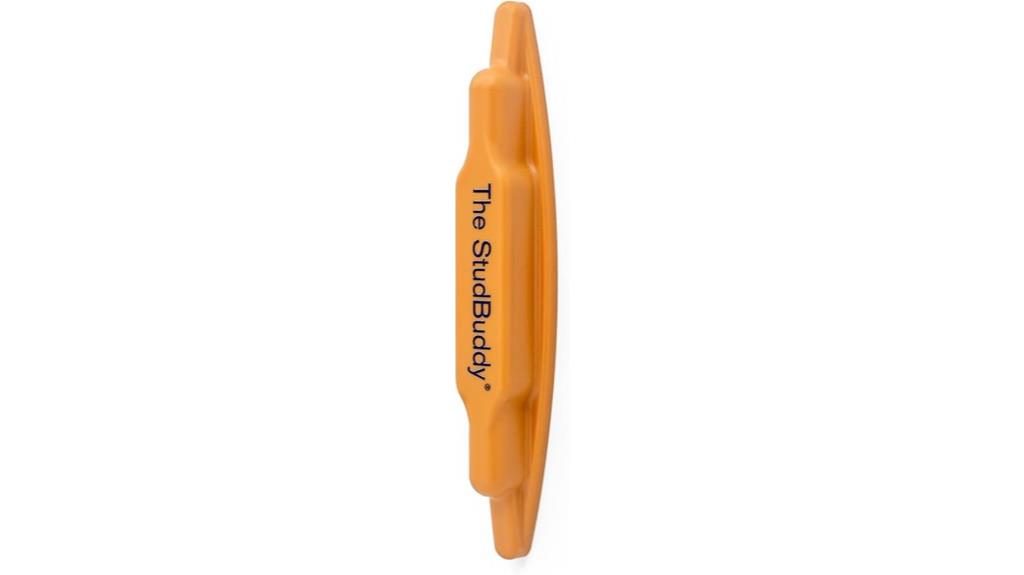
If you’re looking for a straightforward, reliable tool for quick wall stud detection, the Original StudBuddy Magnetic Stud Finder is an excellent choice. Made in the USA, it uses powerful neodymium magnets to locate nail or screw heads in drywall and wood studs. No batteries, calibration, or moving parts are needed, making it simple and always ready to use. Its lightweight, compact design fits comfortably in your hand, perfect for hanging shelves, artwork, or TVs. Just glide it across the wall, and the magnet will stick when it finds a stud. It’s a dependable, low-cost tool that delivers fast, accurate results with minimal effort.
Best For: DIY homeowners and professionals seeking a simple, battery-free stud finder for drywall and wood wall projects.
Pros:
- No batteries or calibration required, always ready to use
- Lightweight and compact for comfortable handling and portability
- Accurate detection of nail or screw heads behind drywall and wood studs
Cons:
- Only detects studs with visible fasteners; may miss non-nail or screw-less studs
- Less effective on textured or painted surfaces that obscure fasteners
- Not suitable for locating pipes, electrical wiring, or non-standard stud structures
CH Hanson 03040 Magnetic Stud Finder
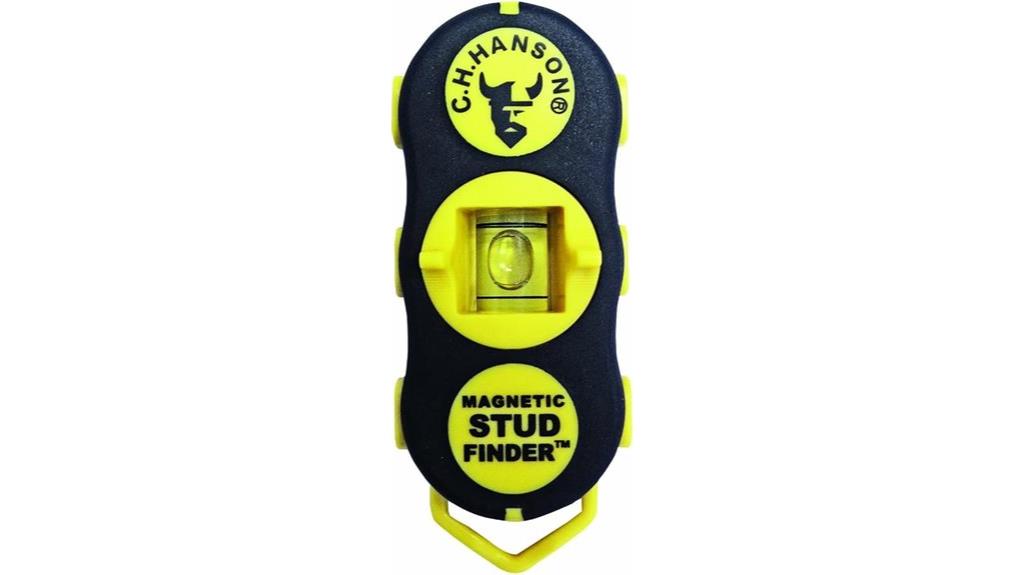
The CH Hanson 03040 Magnetic Stud Finder stands out as an excellent choice for DIYers and professionals who prefer a simple, battery-free tool for wall scanning. Its compact yellow design makes it easy to handle and carry around. The strong magnet effectively detects nails, screws, and metal studs behind walls, ensuring accurate results every time. I appreciate its straightforward operation — just slide it along the wall until it grabs onto a fastener, then mark the spot. No batteries, no fuss. Its reliable performance and durable build make it a favorite for hanging heavy items or working in environments with metal infrastructure. It’s a no-nonsense tool that gets the job done.
Best For: DIYers and professionals seeking a simple, battery-free wall scanning tool for accurately locating metal studs and fasteners behind walls.
Pros:
- No batteries required, easy to operate with straightforward sliding motion
- Strong magnet effectively detects nails, screws, and metal studs behind walls
- Compact, lightweight design makes it portable and easy to handle
Cons:
- Limited to metal detection; cannot locate wooden studs or non-metal objects
- May require multiple passes or careful sliding to find embedded fasteners in some wall types
- Less effective in walls with a high density of metal or electrical wiring nearby
Kreg Magnetic Stud Finder with Laser-Mark
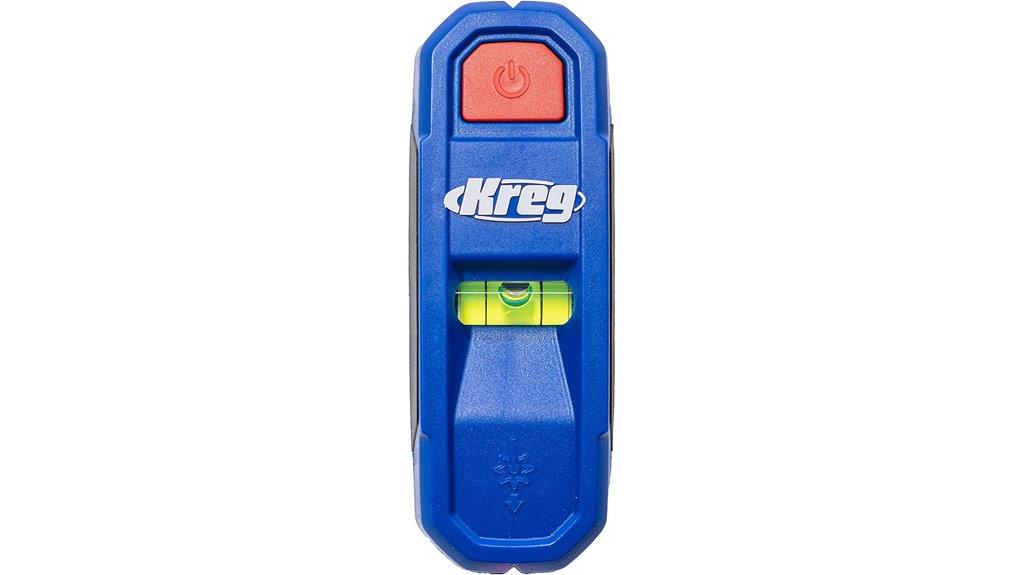
For DIYers and professionals seeking precise stud placement, the Kreg Magnetic Stud Finder with Laser-Mark stands out thanks to its innovative combination of magnetic detection and laser guidance. It uses powerful rare-earth magnets to latch onto nails or screws in studs and includes Laser-Mark technology to project a clear line for accurate placement. Its compact, lightweight design makes it easy to carry and maneuver. The built-in bubble level and precise notches help with leveling and measurement. While the laser works well in daylight, some users find magnet strength limited on complex walls. Overall, this tool offers a high-tech, hands-free way to locate and mark studs quickly and accurately.
Best For: DIYers and professionals seeking precise, quick stud placement with magnetic detection, laser guidance, and leveling features.
Pros:
- Combines magnetic detection with laser projection for accurate stud marking
- Compact, lightweight design for easy handling and portability
- Built-in bubble level and measurement notches enhance accuracy and convenience
Cons:
- Magnet strength may be limited on complex or lathe and plaster walls
- Laser may have a shorter range, only visible from one end of the device
- Slightly higher price point compared to traditional magnetic or electronic stud finders
StudPoP Magnetic Stud Finder with Visual & Audible Indicators

When searching for a reliable stud finder that works on challenging surfaces, the StudPoP Magnetic Stud Finder with Visual & Audible Indicators stands out. It requires no batteries or calibration, featuring a 1-inch moving magnet that provides clear visual and audible signals when a fastener is detected. Designed to be simple and fun, it’s highly sensitive, able to locate nails and screws through thick materials like plaster, tile, and sheetrock. The visual cue pops up instantly, even when magnetic pull is weak, making it ideal for older walls and complex surfaces. Users love its quick, accurate results and affordability, often finding studs within minutes.
Best For: DIY homeowners and professionals working on older or complex wall surfaces who need a reliable, battery-free stud finder for quick and accurate detection.
Pros:
- No batteries or calibration required, ensuring consistent performance.
- Highly sensitive to metal fasteners through thick and challenging surfaces like plaster and tile.
- Provides clear visual and audible indicators for easy, quick identification of studs and fasteners.
Cons:
- May require some practice to differentiate between actual fasteners and other metal objects in the wall.
- Limited to metal fastener detection; cannot locate wooden studs directly.
- The magnetic pull might be weaker on very thin or non-metallic surfaces, potentially requiring multiple scans.
CH Hanson 03040 Magnetic Stud Finder Pack of 2

Ideal for DIYers and professionals alike, the CH Hanson 03040 Magnetic Stud Finder Pack of 2 offers a compact and reliable solution for locating metal fasteners behind walls. Measuring just 8 x 4 x 2.7 inches and weighing only 1.6 ounces, it’s easy to carry everywhere. Its sturdy, ergonomic casing with a soft grip guarantees durability and comfortable handling. The built-in level helps with quick alignment, while the powerful rare earth magnets allow hands-free operation. This tool detects nails, screws, pipes, and conduits but won’t find wooden studs alone. Many users praise its accuracy, long-lasting magnet strength, and affordability, making it a popular choice for home projects and professional jobs.
Best For: DIYers and professionals seeking a reliable, affordable, and portable magnetic stud finder for detecting metal fasteners behind walls.
Pros:
- Compact, lightweight design (8 x 4 x 2.7 inches, 1.6 ounces) for easy portability and handling.
- No batteries or calibration needed; simple to use by attaching to metal fasteners.
- Durable construction with a sturdy casing and strong rare earth magnets for long-lasting performance.
Cons:
- Cannot detect wooden studs without metal fasteners, limiting its scope.
- Does not have electronic sensors, which may be less effective in certain wall types or for more precise detection.
- The magnetic attraction is limited to metal objects, so it may not locate studs or fasteners that are not metal or are embedded deep.
Klein Tools MSF100 Magnetic Stud Finder and Level
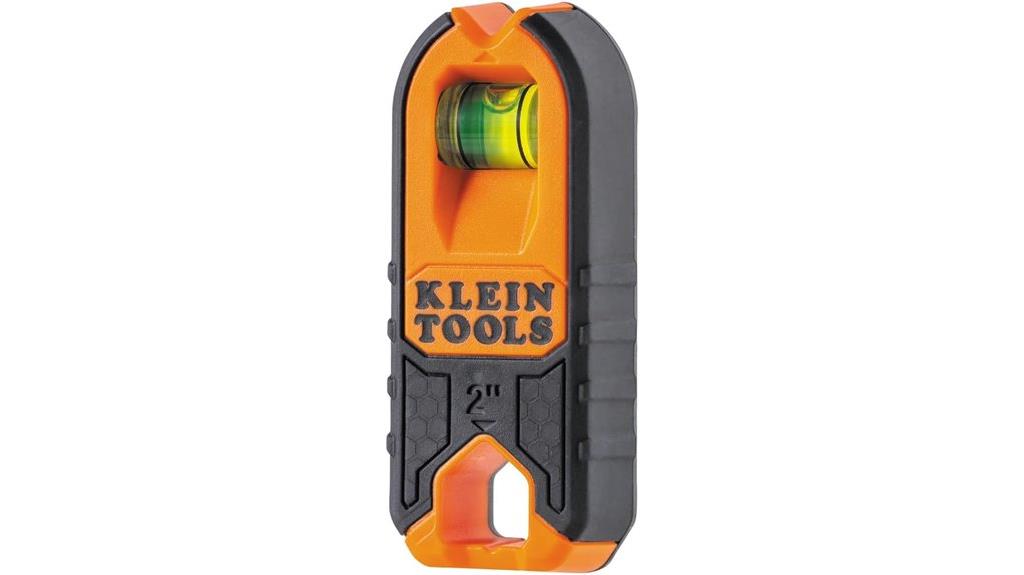
The Klein Tools MSF100 Magnetic Stud Finder and Level stands out as a top choice for DIY enthusiasts and professionals seeking a reliable, battery-free tool. Its powerful N52 Rare-Earth magnet easily detects metal studs, nails, and screws behind drywall or thick walls. The built-in bubble level helps with vertical alignment, while felt pads protect surfaces during use. Compact and lightweight at just 1.76 ounces, it’s easy to carry and store. Crafted with durable materials and able to withstand drops up to 9.9 feet, this tool combines simplicity, durability, and precision—making wall scanning quick, accurate, and hassle-free without the need for batteries.
Best For: DIYers and professionals seeking a reliable, battery-free magnetic stud finder and level for quick, accurate wall scanning.
Pros:
- No batteries required, ensuring hassle-free operation and long-term use
- Strong N52 rare-earth magnet provides reliable detection of metal studs, nails, and screws
- Compact, lightweight design with a built-in bubble level for easy vertical alignment
Cons:
- Less effective on non-metallic studs or walls without metal fasteners
- Less precise compared to electronic stud finders in locating exact stud edges
- Limited to detecting metal objects; cannot locate wooden studs without metal fasteners
Magnetic Stud Finder with 360° Level

A magnetic stud finder with a 360° level is perfect for anyone seeking precise wall alignment and reliable stud detection without relying on batteries. Its extra-strong magnet is three times more powerful than typical models, making it quick and dependable for finding nails and screws in drywall and wood. The built-in 360° bubble level helps guarantee perfect horizontal or vertical alignment when hanging shelves, mirrors, or TVs. Its compact, rugged design weighs just over 3 ounces, and the battery-free operation means it’s always ready to go. Overall, it’s a practical tool for accurate stud locating and wall leveling in any DIY project.
Best For: DIY homeowners and enthusiasts seeking a reliable, battery-free tool for wall stud detection and precise leveling for mounting shelves, mirrors, or TVs.
Pros:
- Extra-strong magnet provides quick and dependable stud detection in drywall and wood.
- Built-in 360° bubble level ensures accurate horizontal and vertical alignment.
- No batteries required, offering maintenance-free, always-ready operation.
Cons:
- Magnet strength may vary, sometimes requiring slight wiggle to confirm studs.
- Occasional reports of magnets falling out or weaker magnetic pull.
- Limited to magnetic detection, which may be less effective on certain wall types or thicker materials.
The Original StudBuddy Plus Magnetic Stud Finder
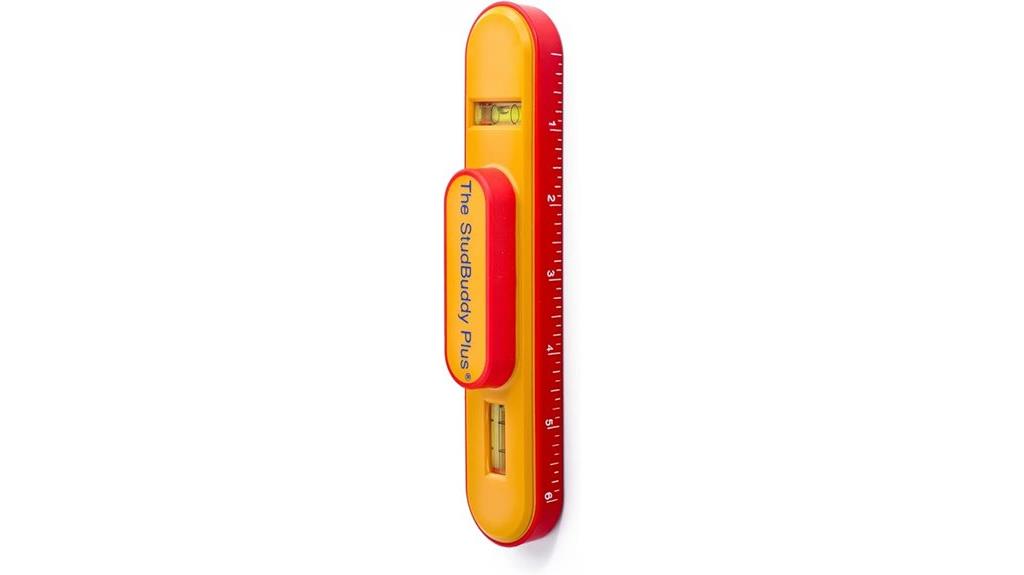
If you’re looking for a straightforward, reliable tool to find wall studs without fuss, the Original StudBuddy Plus Magnetic Stud Finder is a top choice. It’s simple to use, with no batteries or calibration needed, thanks to its powerful neodymium magnets that detect screw or nail heads in drywall and wood. The built-in level helps with precise alignment, making your hanging projects easier. Made in the USA from durable materials, it offers consistent results every time. Keep in mind, it’s best suited for drywall and wood surfaces, not lath and plaster walls. Overall, it’s a low-maintenance, dependable tool for homeowners and professionals alike.
Best For: DIY homeowners and professionals seeking a simple, reliable, battery-free stud finder for drywall and wood surfaces.
Pros:
- No batteries or calibration required for easy use
- Uses powerful neodymium magnets for consistent, reliable detection of screw or nail heads
- Built-in level assists with precise alignment and marking
Cons:
- Not suitable for lath and plaster walls where fasteners are less common
- Magnetic detection may be less effective on very thin or painted wall surfaces
- Limited to drywall and wood; cannot detect studs behind other materials
2 PCS Magnetic Stud Finder
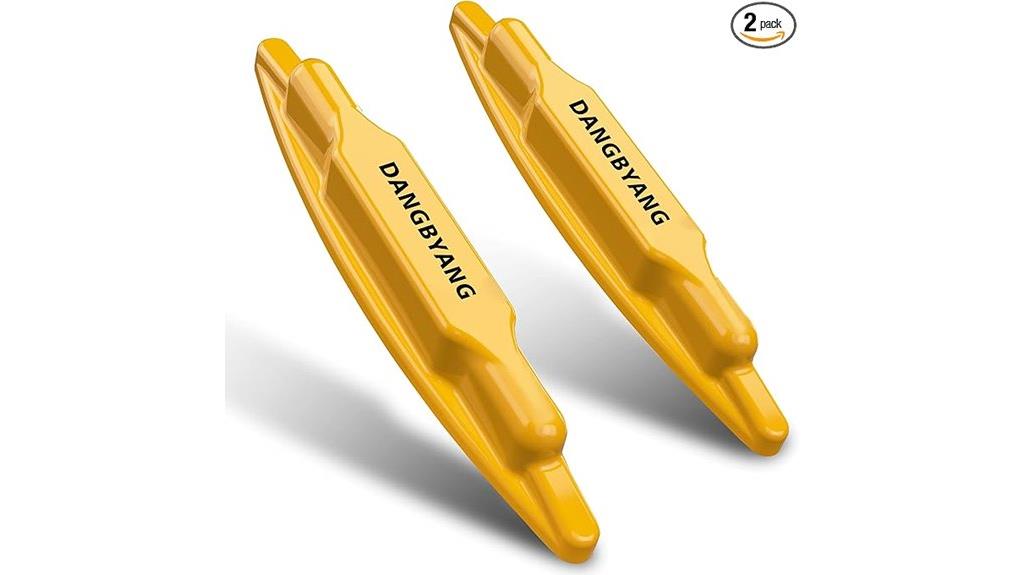
For anyone seeking a straightforward and reliable tool to locate studs without the hassle of batteries or complex setup, the PCS Magnetic Stud Finder stands out as an excellent choice. This pack includes two compact, magnet-powered finders that detect screws, nails, and metal studs behind drywall, making it compatible with most wall types—except lath and plaster. No calibration or batteries are needed, so you can use them instantly. Their durable plastic construction and ergonomic grip make wall scanning easy and comfortable. The magnets securely adhere to wall surfaces, indicating stud positions precisely without causing damage. While some users note magnet strength varies, overall, these finders offer quick, reliable, and affordable wall scanning.
Best For: DIY enthusiasts and homeowners seeking a simple, battery-free tool to locate studs and metal fasteners behind drywall without damaging walls.
Pros:
- No batteries, calibration, or setup required for instant use
- Compact, durable design with ergonomic grip for comfortable handling
- Reliable magnetic detection of nails, screws, and metal studs across various drywall types
Cons:
- Magnet strength can vary, potentially affecting detection accuracy
- May require patience to locate studs, especially if magnets are weaker than expected
- Not suitable for lath and plaster walls, limiting its versatility in older homes
52300 Studball Magnetic Stud Finder (27 Pounds Pull Power, No Batteries)

The 52300 Studball Magnetic Stud Finder stands out with its powerful 27-pound pull magnet, making it ideal for anyone seeking a reliable, battery-free tool for wall scanning. Its rare earth magnet quickly detects metal objects like screws, nails, and studs through drywall, plywood, ceramic tiles, and wood panels. It’s simple to use—just position it against the wall, and the magnet will latch onto metal fasteners, pinpointing stud locations without calibration or marking. It can find over 40 metal studs in a minute, works through up to 5/8″ drywall, and even doubles as a magnetic hook or tool holder. Durable and effective, it’s a smart addition to any toolbox.
Best For: DIY enthusiasts, homeowners, and professionals seeking a reliable, battery-free magnetic stud finder for quick wall scanning and metal object detection.
Pros:
- No batteries required, ensuring long-term reliability and convenience.
- Strong 27-pound pull magnetic force provides quick and accurate detection through various wall materials.
- Versatile tool doubles as a magnetic hook and tool holder, adding multifunctionality.
Cons:
- May have limited sensitivity for very small or hidden metal objects.
- Some users desire a lower price point despite its proven effectiveness.
- Does not provide digital or electronic readings, relying solely on magnetic detection.
Powerful Magnetic Stud Finder (Upgraded Version)
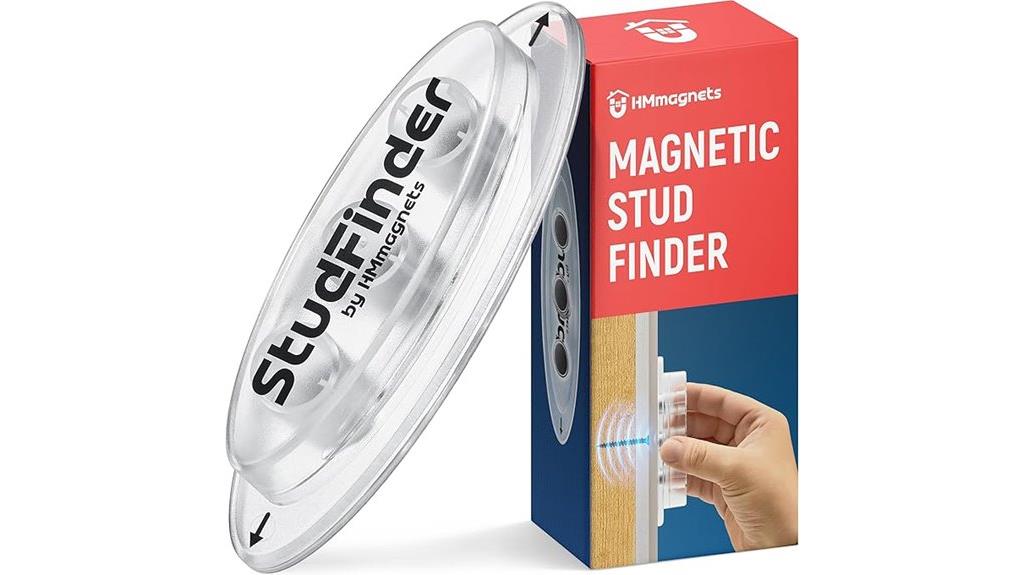
The Powerful Magnetic Stud Finder (Upgraded Version) stands out with its enhanced detection capabilities, thanks to three strong neodymium magnets that can locate both wood and metal studs more deeply and accurately. Its larger size, measuring 4.72×1.18×1 inches, allows for faster, broader wall scanning, saving time. The transparent design with built-in marking arrows enables precise, hands-free drilling, reducing guesswork. No batteries are needed, making it durable, portable, and always ready to use. It works well on drywall, painted drywall, wallpaper drywall, and tiled drywall, though it’s less effective on thick plaster or heavily textured surfaces.
Best For: DIY enthusiasts, homeowners, and professionals seeking a reliable, battery-free magnetic stud finder for quick and accurate wall scanning and fixture installation.
Pros:
- Features three powerful neodymium magnets for deeper and more precise detection of studs and fasteners.
- Larger size allows for faster, broader wall scanning, increasing efficiency.
- Transparent design with built-in marking arrows enables hands-free, accurate drilling without guesswork.
Cons:
- Less effective on thick plaster, heavily textured surfaces, or double drywall, limiting versatility on certain wall types.
- Magnetic attraction strength may vary depending on wall surface, sometimes weaker on textured or wallpapered walls.
- Does not detect studs behind very thick or dense wall materials, requiring additional tools for certain applications.
2 Pcs Magnetic Stud Finder with Level

If you’re looking for a reliable tool that combines magnetic detection with precise alignment, the Pcs Magnetic Stud Finder with Level is an excellent choice. It’s battery-free and easy to use, making it perfect for drywall, wood, and paneling. The powerful magnets help locate nails, screws, and fasteners behind walls, while the built-in bubble level guarantees straight lines for accurate mounting. Compact and lightweight, this tool fits easily in your pocket or toolbox. While it requires slow, careful movement for best results, it’s especially useful for hanging TVs, shelves, or framing. Overall, it’s a simple, effective solution for DIYers and professionals alike.
Best For: DIY enthusiasts and professionals seeking a reliable, battery-free tool for accurately locating wall studs and aligning mounts.
Pros:
- Magnetic detection ensures precise locating of nails, screws, and fasteners behind walls
- Built-in bubble level helps achieve straight, professional-looking installations
- Compact, lightweight design makes it portable and easy to carry in a pocket or toolbox
Cons:
- Requires slow, careful movement for effective stud detection
- Magnet strength can vary depending on wall thickness and material, possibly affecting performance
- Some users report difficulty locating nails or studs in certain drywall conditions
Dreyoo Stud Finder Wall Scanner (2 Pcs)
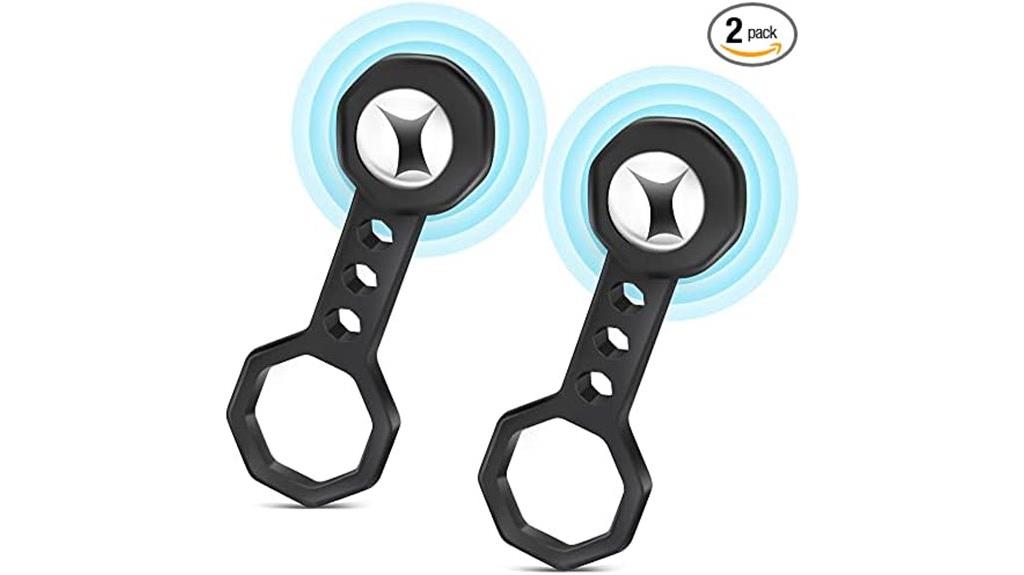
For DIYers and homeowners seeking an easy, battery-free way to locate studs and hidden metal objects, the Dreyoo Stud Finder Wall Scanner (2 Pcs) offers a reliable solution. These magnetic stud finders deliver a strong 27-pound magnetic pull force, making it simple to detect nails, screws, and metal behind drywall, plywood, or tiles up to 3/4 inch thick. Compact and lightweight, each unit is easy to carry and store, perfect for quick home repairs or decorating projects. Customers praise their strength and accuracy, with no batteries needed. Overall, this set provides an effective, portable, and budget-friendly tool for precise wall scanning.
Best For: DIYers, homeowners, and decorators seeking a battery-free, portable solution for accurately locating studs and metal objects behind walls and tiles.
Pros:
- No batteries required, ensuring easy and maintenance-free operation.
- Strong 27-pound magnetic pull force for quick, precise detection of metal and studs.
- Compact, lightweight design for portability and convenient storage.
Cons:
- Slightly smaller size may make it less easy to handle for some users.
- Magnets can sometimes fall out of rubber sleeves, affecting durability.
- Moderate popularity ranking may indicate limited advanced features compared to electronic stud finders.
Stud Finder Wall Scanner with Magnetic Power
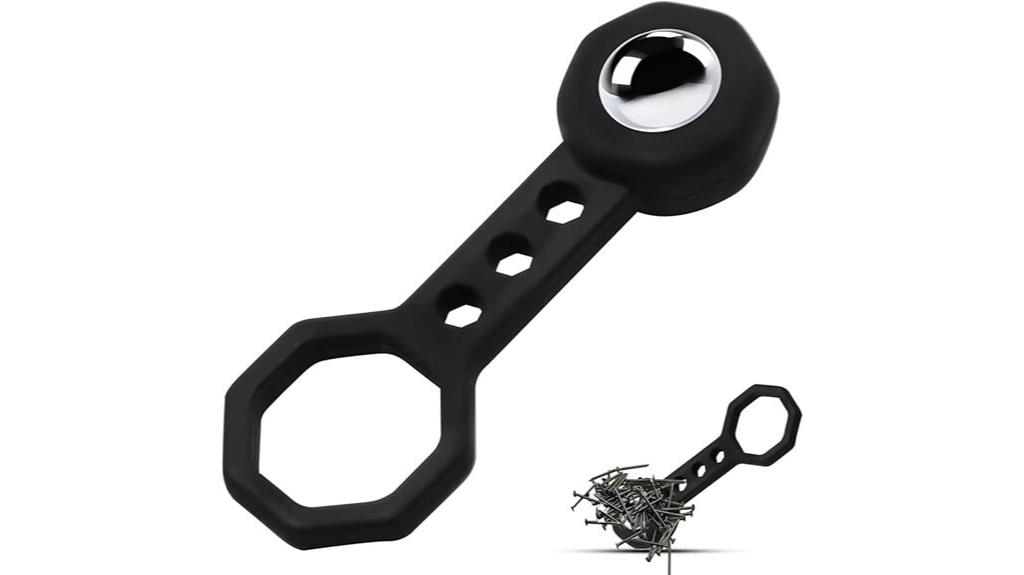
A magnetic stud finder with powerful metal detection capabilities is an excellent choice for DIYers and professionals who need quick, reliable wall measurements without worrying about batteries or false positives. This compact device features 27 pounds of magnetic pull strength, making it easy to attach to walls and locate studs, nails, or screws in drywall, plywood, ceramic tile, or wood frames. Its lightweight design (just over half an ounce) and built-in hanging hole enhance portability. Made from durable alloy steel, it’s ideal for manual operation, providing fast and accurate detection of metal in walls. Perfect for hanging projects or renovations, it’s simple to use and highly dependable.
Best For: DIY enthusiasts and professionals seeking a reliable, battery-free magnetic wall scanner for quick and accurate metal detection in various wall types.
Pros:
- No batteries required, ensuring continuous use without concern for power sources.
- Strong magnetic pull (27 pounds) allows for easy attachment and precise detection of studs, nails, or screws.
- Compact, lightweight design with a hanging hole makes it highly portable and easy to carry or store.
Cons:
- The magnet’s strength may cause it to stick to unintended metal objects, requiring careful handling.
- Limited to magnetic detection; cannot identify non-metallic materials or electrical wiring behind walls.
- Slightly smaller size may require some practice to scan thoroughly and accurately locate studs.
Calculated Industries 7310 StudMark Magnetic Stud Finder
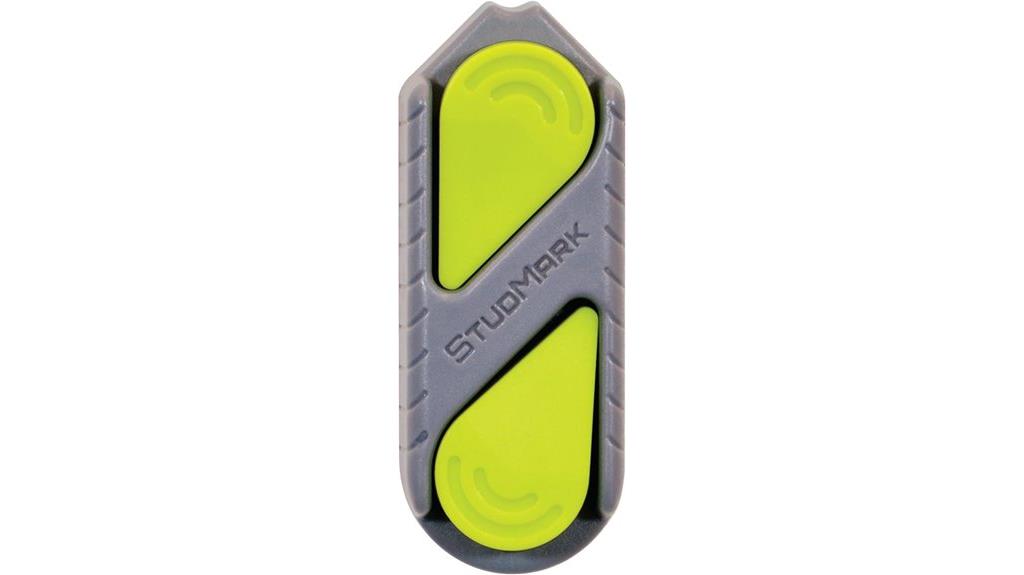
The Calculated Industries 7310 StudMark Magnetic Stud Finder stands out as an excellent choice for DIYers and professionals seeking a reliable, mess-free way to locate studs without batteries or complex calibration. Its powerful rare-earth magnets attach securely to nail or screw heads in drywall and sheetrock, making detection straightforward. The kit includes two magnetic markers that let me visually mark up to three stud locations simultaneously, reducing guesswork. Its compact size and lightweight design make it portable and easy to use, especially for mounting shelves, picture frames, or fixtures. Overall, it’s a simple, effective tool that offers accurate wall marking without the hassle of electronic devices.
Best For: DIYers and professionals seeking a reliable, mess-free wall stud marking tool without batteries or complex calibration.
Pros:
- Strong rare-earth magnets securely attach to nail or screw heads, ensuring accurate detection
- Visual markers allow for marking multiple stud locations simultaneously, reducing guesswork
- Compact, lightweight design makes it portable and easy to handle during various projects
Cons:
- Less effective on plaster or older walls with thick or non-metallic surfaces
- Potential false positives from non-stud nails or screws in the wall
- Not suitable for detecting studs behind thick, textured, or heavily painted surfaces
Factors to Consider When Choosing Magnetic Stud Finders
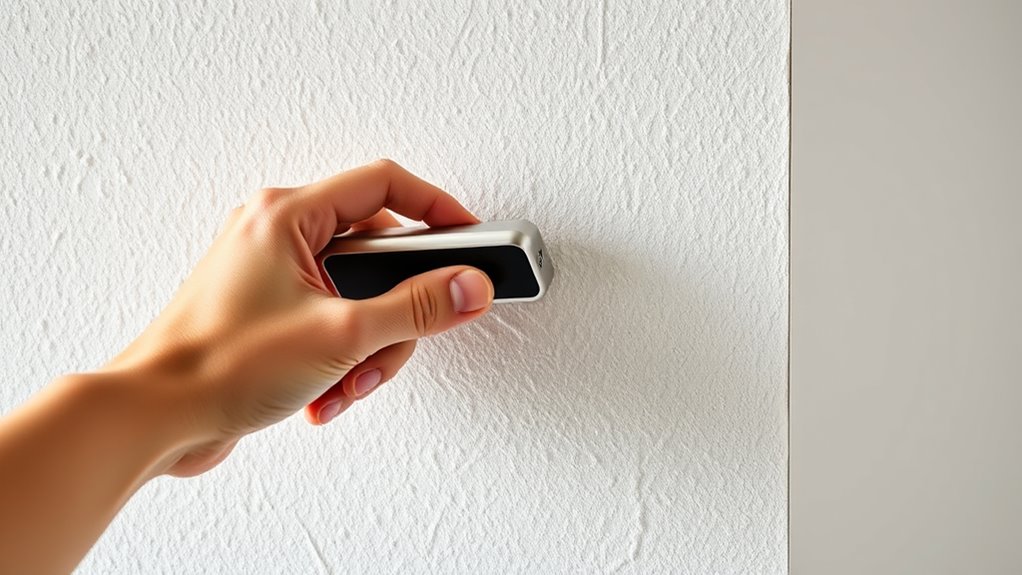
When selecting a magnetic stud finder, I consider factors like magnet strength and size to guarantee it detects nails and screws reliably. I also look at wall compatibility and additional features to match my projects and make the tool easier to use. Understanding power needs and extra functions helps me choose a device that’s both practical and efficient.
Magnet Strength and Size
Choosing the right magnetic stud finder depends heavily on magnet strength and size. The magnet’s strength determines how effectively it can attract fasteners like nails or screws through different wall materials. A stronger magnet, with a pull force up to 27 pounds in some models, means more reliable detection with fewer passes. Larger magnets generally offer a stronger magnetic pull, making it easier to find embedded fasteners quickly. Additionally, a bigger magnet covers a broader area, speeding up the search process and increasing accuracy. This strength reduces the need for multiple scans, especially behind thick or textured walls. Ultimately, selecting a magnet with the right balance of size and power ensures more efficient, precise wall scanning, saving you time and effort during your project.
Wall Compatibility and Materials
Selecting the right magnetic stud finder involves considering how well it works with different wall types and materials. These tools excel on drywall, wood, and metal surfaces where nails or screws are embedded, but they struggle with thick plaster or lath and plaster walls. Walls with fewer or hidden fasteners can reduce detection accuracy, so understanding your wall’s construction is essential. Textured, painted, or wallpapered surfaces can also hinder the magnet’s ability to detect fasteners, often requiring slower passes or multiple scans. The thickness and material of the wall play a significant role; denser or thicker walls make it harder for magnets to reach embedded fasteners. Always verify compatibility with your specific wall type, as some magnetic stud finders are optimized solely for drywall.
Ease of Use Features
A magnetic stud finder is most effective when it’s easy to use, which means it should have a strong, reliable magnet that quickly grabs onto fasteners without complicated adjustments. The tool should be lightweight and ergonomically designed, so I can comfortably operate it with one hand during wall scanning. Clear indicators, like visual cues or audible signals, are essential—they help me know instantly when a fastener or stud is located. Features such as built-in levels or markings make it easier to align and mark studs without needing extra tools or guesswork. A user-friendly magnetic stud finder minimizes setup and calibration, allowing even DIY beginners to detect studs quickly and confidently. This simplicity saves time and makes the entire wall scanning process more efficient.
Power Source Requirements
Many magnetic stud finders operate without batteries, relying solely on the strength of neodymium magnets to detect metal fasteners behind walls. This means they don’t need any power source, making them simple, reliable tools that are always ready to use. Battery-free models tend to be more durable and require less maintenance since they lack electronic components that can fail over time. Their lightweight, compact design enhances portability, perfect for quick wall scans. Unlike electronic stud finders that need batteries and calibration, magnetic versions eliminate setup time and reduce user error. However, their effectiveness depends on the magnet strength and the presence of metal fasteners in the wall. Overall, the simplicity of battery-free magnetic stud finders makes them a dependable choice for many DIYers and professionals.
Additional Functionalities
When choosing a magnetic stud finder, considering additional functionalities can make a big difference in how effectively it meets your needs. Many models come with built-in levels, laser guides, or visual and audible indicators that boost accuracy and ease of use. Some feature multiple magnets or stronger magnetic pulls, making it easier to detect fasteners behind different wall materials. Integrated marking systems or removable magnetic markers help you precisely record stud locations without extra tools. Ergonomic designs, anti-slip grips, and protective covers improve handling and safety during scanning. Advanced models even combine multiple functions, like stud detection, wall leveling, or small metal object retrieval. These extra features can save time, improve precision, and make your wall scanning experience much more efficient.
Frequently Asked Questions
How Do Magnetic Stud Finders Differentiate Between Metal Types?
Magnetic stud finders don’t really differentiate between metal types; they’re designed to detect magnetic metals like iron and steel. When I use one, I look for the magnetic pull on the detector’s magnet or metal plate. They’re great for finding nails or screws in walls, but if you need to distinguish between different metals, I’d recommend a more advanced electronic or metal type-specific scanner.
Can Magnetic Stud Finders Detect Non-Metallic Objects Behind Walls?
You might be surprised, but magnetic stud finders can’t detect non-metallic objects behind walls. They work by attracting ferrous metals like nails or screws, so anything made of plastic, wood, or other non-metallic materials won’t trigger the sensor. If you’re trying to find pipes or wires, a different type of scanner, like a wall scanner with electronic sensors, is your best bet. Magnetic finders excel at metals, but not non-metallics.
What Is the Maximum Wall Thickness Magnetic Stud Finders Can Scan?
Magnetic stud finders can typically scan wall thicknesses up to about 1.5 inches, depending on the strength of their magnets. I’ve found that thicker walls, like those in some commercial buildings, might be challenging for magnetic finders. For best results, I recommend testing your specific model on a small section of wall first. Keep in mind, thicker walls may reduce the magnet’s effectiveness in locating studs behind the surface.
Are Magnetic Stud Finders Effective on All Wall Surfaces?
Magnetic stud finders are surprisingly versatile, but they’re not magic on every wall surface. I’ve found they work best on drywall and wood, where metal targets are easier to detect. On textured or uneven surfaces, they might struggle, like trying to find a needle in a haystack. Still, with patience and proper technique, they’re effective for most standard walls, making your DIY projects much simpler.
How Do Magnetic Stud Finders Perform in High-Humidity Environments?
Magnetic stud finders perform well in high-humidity environments because they rely on magnets to detect metal objects, not electronics that can be affected by moisture. I’ve used mine in damp areas without issues, and they remain accurate. Just make sure the wall surface isn’t too wet or greasy, as that can interfere with the magnet’s ability to attract studs. Overall, they’re reliable even in humid conditions.
Conclusion
In the end, finding the right magnetic stud finder is like finding a needle in a haystack—persistence pays off. With the options I’ve shared, you’re well-equipped to make an informed choice. Remember, the right tool can turn a intimidating task into a breeze. So, don’t just settle for less—choose wisely, and you’ll be hanging pictures or shelves with confidence in no time. Happy scanning!









